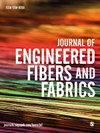经向交替使用弹性和非弹性纱线对双拉伸机织物收缩和拉伸性能的影响
IF 2.3
4区 工程技术
Q1 MATERIALS SCIENCE, TEXTILES
引用次数: 0
摘要
弹性机织物以其弹性和恢复性能而闻名。到目前为止,他们发现了许多有趣的应用,从简单的牛仔裤到具有功能特性的复杂织物结构,例如用于医疗保健应用的双拉伸膨胀机织物、压缩服装和可拉伸织物载体。对可拉伸针织物和机织物的物理、机械和舒适性能进行了许多研究。然而,识别具有不同拉伸性能和其他设计参数的纱线组合,以满足双拉伸机织物生产和使用中的多个目标,是织物科学家最近研究的一个领域。本研究比较了在纬纱方向上使用弹性纱线和弹性和非弹性交替纱线对双拉伸机织物性能的影响。研究发现,由于收缩平衡效应,弹性纱线织物在经向上的收缩率高于在纬向上的织物;然而,在由经向弹性纱线和非弹性纱线交替制成的织物的情况下,收缩行为正好相反。对不同织法的收缩率进行比较,发现缎面收缩率最高,其次是斜纹和平纹,这是因为这三种织法中缎面交织次数最少。本文章由计算机程序翻译,如有差异,请以英文原文为准。
Effect of using alternate elastic and non-elastic yarns in warp on shrinkage and stretch behavior of bi-stretch woven fabrics
Stretch woven fabrics are known for their elastic and recovery properties. To date, they found many interesting applications from simple jeans to complex fabric structures with functional properties for example bi-stretch auxetic woven fabrics, compressions garments and stretchable textile carriers for healthcare applications. Many studies have been carried out on the physical, mechanical and comfort properties of stretchable knitted and woven fabrics. However, to identify combination of yarns with different stretch properties and other design parameters required to meet multiple objectives in the production and usage of bi-stretch woven fabrics is an area that has been taken up by fabric scientists recently. This study compared the effect of using elastic yarns and alternate elastic and non-elastic yarns in warp on the properties of bi-stretch woven fabrics while using elastic yarns in weft direction. It was found that shrinkage of the fabrics made of elastic yarns was higher along the warp direction as compared to that in weft direction due to shrinkage balancing effect; however, in case of fabrics made of alternate elastic and non-elastic yarns in warp the shrinkage behavior was exact opposite. The comparison of shrinkage for different weave patterns revealed that satin had the highest shrinkage followed by twill and plain, due to least number of interlacements in satin among these three patterns.
求助全文
通过发布文献求助,成功后即可免费获取论文全文。
去求助
来源期刊

Journal of Engineered Fibers and Fabrics
工程技术-材料科学:纺织
CiteScore
5.00
自引率
6.90%
发文量
41
审稿时长
4 months
期刊介绍:
Journal of Engineered Fibers and Fabrics is a peer-reviewed, open access journal which aims to facilitate the rapid and wide dissemination of research in the engineering of textiles, clothing and fiber based structures.
 求助内容:
求助内容: 应助结果提醒方式:
应助结果提醒方式:


